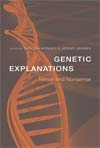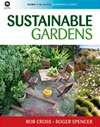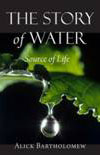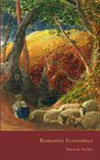
Genetic Explanations
Sense and Nonsense Edited by Sheldon Krimsky and Jeremy Gruber
Sheldon Krimsky and Jeremy Gruber gather a team of genetic experts (including Dr. Mae-Wan Ho) to argue that treating genes as master molecules of the universe is a patently unscientific endeavour. Genes are neither our destroyers nor our saviors. Genetic Explanations urges us to replace our faith in hard-wired genes with scientific knowledge about what’s really “in our DNA.”
|
|
|

Sustainable Gardens by Rob Cross & Roger Spencer
Sustainable gardens introduces sustainability science applied to horticulture, and provides the necessary background on how to manage cultivated land as part of a general strategy for leading more sustainable lives in our increasingly urbanised world. It places horticulture within the complex context of ecology, environmental and social management, and practical gardening. The book begins by introducing sustainability, its relationship to landscapes and gardens, and then proceeds to chapters on sustainable garden design, sustainability in the broader landscape, landscape construction and maintenance.
For more: www.rbg.vic.gov.au/science/information-and-resources/science-publications/sustainable-gardens Available: Australia: www.publish.csiro.au/pid/5956.htm; North America www.styluspub.com; Europe, Mid East & N Africa: www.eurospanbookstore.com

Story of Water – Source of Life by Alick Bartholomew
How water creates and sustains life, stimulating evolution, balancing the environment, constantly encouraging greater complexity and interdependence and integrity in all creation. The author summarises knowledge from mainstream science and introduces new quantum research into water and life: Schauberger, Backster, Schwenk, Mae-Wan Ho and others; proposes that the water medium is the partner of the quantum field in bringing cosmic building patterns to life forms.
“One of those rare books which bring science, spirituality and practicality into one integrated whole.” Satish Kumar, Resurgence
For more: www.alickBartholomew.co.uk

Romantic Economics by Patrick Noble
Modernism in our arts, technologies and ways of life could only survive by the bounty of fossil fuels. It needs to be replaced by the new romanticism, which is at once as old as the hills. As the retail parks decay, convivial town centres revive. Civilisation is not a state, but a method. We cultivate our gardens, build our houses and love our friends. True cities emerge from agriculture. How else can they be fed?
Patrick Noble is an organic farmer from Denbigh in North Wales.
Romantic Economics, 280 pages. available at £7.50 from all good bookshops or from the author, info@bryncocynorganic.co.uk, or telephone 01745 540207
Comments are now closed for this article